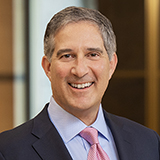Areas of Focus
Morgan Lewis helps healthcare industry clients navigate the full spectrum of novel and evolving legal, regulatory, and policy issues they face when evaluating the use of AI, ML, and other digital health technologies and services, including:
- Telehealth regulations and digital health technology governance
- HIPAA compliance, cybersecurity, and breach remediation for protected health information (PHI)
- Compliance with and defense of investigations related to the Information Blocking regulations, 42 CFR Part 2, and state privacy laws
- FDA regulation of AI/ML and other digital health technologies
- Formation, financing, and M&A counsel for digital health arrangements, including joint ventures and licensing agreements
- IP protection and licensing for digital health tools, including mobile medical apps and blockchain technologies
- Digital health commercial and technology-related litigation support
Morgan Lewis offers a leading practice representing hospice and homecare providers in the nonprofit and for-profit sectors, including representing investors in the post-acute care space. We offer expansive industry knowledge to provide effective, solutions-oriented counsel for:
- Regulatory counseling and compliance
- Medicare and Medicaid audit response and appeals, government investigation response and defense, and survey preparedness and response
- M&A and commercial transactions, joint ventures, and affiliations
- Privacy and data security
- Payor program enrollment and credentialling, medical director relationships and contracting, palliative care program development, and innovative payment models for home health and hospice care
- HR, employment, and labor law advice
Morgan Lewis takes a collaborative and integrated approach to protecting the commercial viability of hospitals, health systems, and academic medical centers. We advise on:
- Hospital and health system M&A transactions and related antitrust counsel, including affiliations and joint ventures with providers such as physician practices, ambulatory surgical centers, pharmacies, diagnostic testing suppliers, dialysis facilities, post-acute care providers, and long-term care facilities
- Medicare reimbursement advice and appeals, including graduate medical education (GME), indirect medical education (IME), and disproportionate share hospital (DSH)
- Regulatory counsel involving Stark Law, anti-kickback statutes, HIPAA, the Information Blocking regulations, 42 CFR Part 2, and state healthcare privacy laws, as well as clinical research counsel and advocacy before the Institutional Review Board (IRB) and FDA
- Labor and employment counsel, including ERISA and employee benefit counseling and litigation
- Government investigations and audits involving Medicare, Medicaid, TRICARE, and other government programs, as well as security breach response and investigations
- Counseling on tax issues and audit support for 501(c)(3) hospitals and the accompanying 501(r) requirements, and related state charity care counseling and investigation defense
- Title VII and Section 1557 advice and investigation defense
For our long-term and post-acute care facility clients, we remain dedicated to ensuring ongoing regulatory compliance, supporting staffing resilience, closing critical M&A transactions, establishing strong partnerships, and leveraging technological integration. We counsel clients on:
- Government audits and investigations related to allegations of unnecessary therapy, substandard care, or improper billing
- Fraud and abuse, anti-kickback law compliance
- Regulatory standards, certification, conditions of participation, and survey response
- Medicare and Medicaid reimbursement and billing matters
- Business transactions and due diligence analysis
We work with retail, specialty and compounding pharmacies, pharmacy benefit managers (PBMs), vendors to the industry, wholesalers, and distributors on a wide array of state and federal law matters, including serving as counsel to national chain pharmacies and retailers on government investigations and audits.
- FCA investigations and qui tam litigation defense
- Commercial contract advice and regulatory review for state board of pharmacy, privacy, FDA and DEA requirements
- IP protection ranging from patent prosecution to infringement defense
- Litigation involving product liability, antitrust, and consumer claims
- Cybersecurity measures and breach response strategies
- Emerging pharmacy services and technological integration
Our team works with investors, lenders, and deal professionals in the private equity, venture capital, and strategic transaction spaces to craft effective deal structures across highly regulated healthcare sectors. Our work covers acquisitions, divestitures, growth equity investments, and co-investments and includes:
- Platform and strategic investment guidance
- Transaction leadership and consummation
- Healthcare regulatory counsel and compliance
- Tax structuring and advice
- Antitrust analysis and clearance for healthcare transactions
- Day-to-day counsel to healthcare portfolio companies of our PE clients
- Litigation support










